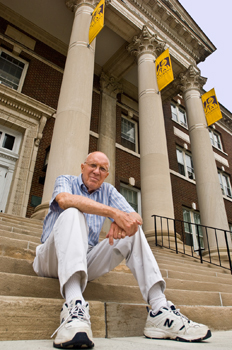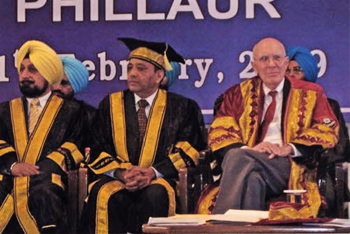Bayley on Counterterrorism in India
 |
While in India recently, Distinguished Professor of Criminal Justice David Bayley gave 23 speeches on policing in 21 days, covering a lot of ground. (Photo Mark Schmidt) |
Addressing the role of police in counterterrorism was on the agenda of Distinguished Research Professor of Criminal Justice David Bayley, who traveled to India in February at the invitation of the U.S. Department of State.
Bayley, a specialist on international criminal justice, met with the commissioners of police and their senior officers in Mumbai and Calcutta. He was also the keynote speaker at the Punjab Police Academy graduation.
In the wake of the Nov. 26 terrorist attack on a Mumbai hotel, the FBI went to Mumbai to assist.
"It was a diplomatic breakthrough," said Bayley, who believes police forces in India and the U.S. have a shared interest in the most advanced electronic surveillance technology to be used in counterterrorism.
"I gave 23 speeches in 21 days and stayed at 11 hotels, so I covered a lot of ground," said Bayley, who has done extensive research on policing in India, Japan, Australia, Canada, Great Britain, Singapore and the U.S. Police discipline and accountability, police strategies, and crime prevention were additional topics he addressed abroad.
Bayley has been to India many times since his first visit in 1963, and was a consultant to the National Indian Police Commission, which made recommendations in the 1970s that have not been put in place. These include minimizing the political influences on policing and raising competency and education levels of constables, the equivalent of police officers.
"I said it's time to take those reforms off the shelf," said Bayley, who was drawn to study international policing because of the decolonization that was unfolding around the world when he was in graduate school at Oxford and later Princeton. He wanted to find out what institutions were needed to make newly emerging nations hang together.
 |
At right, UAlbany Distinguished Professor of Criminal Justice David Bayley is seated with dignitaries at the Punjab Police Academy graduation. He was the keynote speaker. (Photo, courtesy of David Bayley) |
Bayley stressed the importance of professionalism, education, and good policing during his commencement address. He draws parallels between the U.S. and India: both are democracies and both are involved in policing a society that is diverse in race and religion.
He noted that good policing is "absolutely crucial for political stability."
"There are 192 countries in the U.N. and I wouldn't want to be stopped by the police in more than 15 of them," he said, adding that the number of countries in which policing is humane and respectful of human rights is rare. "We should never forget how lucky we are in the U.S. when it comes to policing," he said. "Do we have problems? Yes, but they are minimal compared with those in the rest of the world. Count your blessings."
Bayley also said that while the 9/11 attack on U.S. soil was episodic terrorism, India has more experience than the U.S. in handling systematic guerilla insurgencies, which are among the challenges faced by the U.S. in Iraq and Afghanistan. The U.S. can learn from India in this area, he said.
![]() For more news, subscribe to UAlbany's RSS headline feeds
For more news, subscribe to UAlbany's RSS headline feeds


